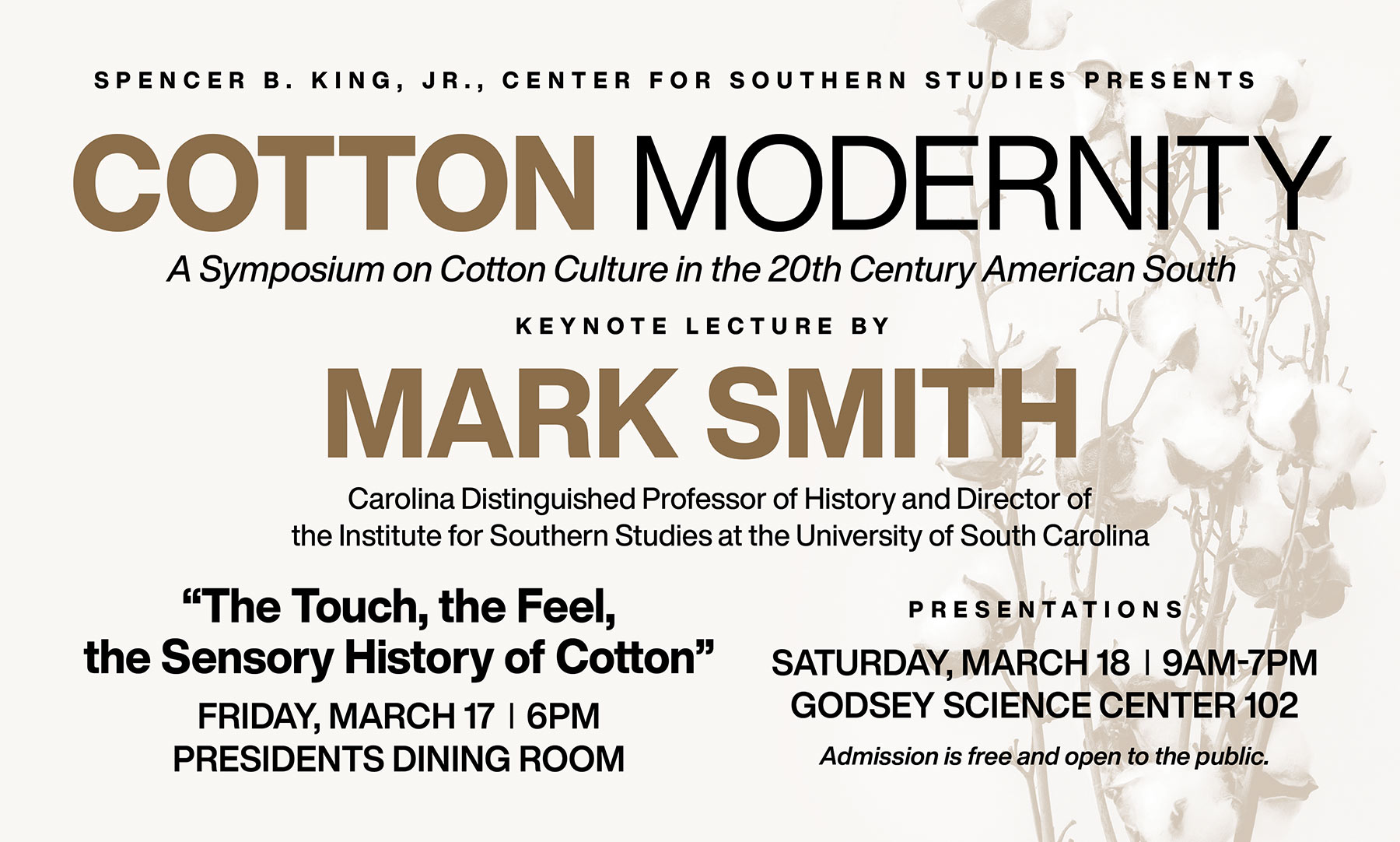Cotton Modernity

No single commodity had a greater effect on America’s history and culture than cotton. In the antebellum United States, King Cotton propelled an economic boom that led to the dispossession of southeastern Native Americans, the development of plantations across the South, and an explosion in the domestic slave trade that inevitably led to the Civil War. But what happened after the war?
This symposium brings together many of the nation’s most prominent scholars of the culture of cotton, who will explain how cotton continued to define the socioeconomic culture of the South for the century after the Civil War. Historians, literary critics, and cultural scholars will discuss how cotton affected southern life from the late nineteenth century to the twenty-first century in agriculture, politics, labor, music, literature, and film.
The keynote address will take place in the Presidents Dining Room of the University Center on Friday, March 17, at 6:00 pm followed by a full day of presentations on Saturday, March 18, from 9:30 am to 7:00 pm in Godsey Science Center room 102. All of the lectures are free and open to the public.
“The Touch, The Feel, The Sensory History of Cotton”
Mark Smith, Presidents Dining Room, Friday, March 17, 6 p.m.
 Cotton harbors a hidden history of tactility—of hands, fingers, skin—that is at once intimate yet public, comforting yet cruel. In 1992, Cotton Incorporated invited us to experience “The Touch, The Feel, of Cotton, The Fabric of Our Lives.” This wildly successful ad occluded much, not least the brutal history of tactility that underwrites the feel of the fabric. How cotton was harvested, the expectations placed on the skins that produced it, stands in marked contrast to the consumption-oriented, skin-friendly message of the ad. I offer here a haptic history of cotton to complicate “our” lived experience with the fabric.
Cotton harbors a hidden history of tactility—of hands, fingers, skin—that is at once intimate yet public, comforting yet cruel. In 1992, Cotton Incorporated invited us to experience “The Touch, The Feel, of Cotton, The Fabric of Our Lives.” This wildly successful ad occluded much, not least the brutal history of tactility that underwrites the feel of the fabric. How cotton was harvested, the expectations placed on the skins that produced it, stands in marked contrast to the consumption-oriented, skin-friendly message of the ad. I offer here a haptic history of cotton to complicate “our” lived experience with the fabric.
Mark Smith is Carolina Distinguished Professor of History and Director of the Institute for Southern Studies at the University of South Carolina. He is author or editor of over a dozen books, including Mastered by the Clock: Time, Slavery, and Freedom in the American South and How Race Is Made: Slavery, Segregation, and the Senses, and his work on southern and sensory history has been translated into Chinese, Korean, Danish, German, and Spanish. His work has been reviewed and featured in the New York Times, the London Times, the Washington Post, and the Wall Street Journal. He is a Fellow of the Royal Historical Society and currently serves on the US Commission for Civil Rights.
“Picking Cotton: The Pride and Pain of the Harvest during the Era of Southern Enclosure”
Adrienne Petty | Godsey Science Center 102 | Saturday, March 18 | 9:30 a.m.
 This paper focuses on the contradictory memories and meaning of cotton for black and white Southerners who came of age during the Jim Crow era. In particular, it focuses on those with experience harvesting the crop by hand before and during the southern enclosure movement. While later generations of southerners with no firsthand experience working cotton often associate it with the inhumanity of slavery, those with intimate knowledge of and experience with the crop view it with ambivalence. They take pride in their knowledge of cotton while decrying the physical toll of producing it. Analyzing these memories is instructive as society continues to grapple with racism, class inequality, and the politics of essential work and automation.
This paper focuses on the contradictory memories and meaning of cotton for black and white Southerners who came of age during the Jim Crow era. In particular, it focuses on those with experience harvesting the crop by hand before and during the southern enclosure movement. While later generations of southerners with no firsthand experience working cotton often associate it with the inhumanity of slavery, those with intimate knowledge of and experience with the crop view it with ambivalence. They take pride in their knowledge of cotton while decrying the physical toll of producing it. Analyzing these memories is instructive as society continues to grapple with racism, class inequality, and the politics of essential work and automation.
Adrienne Petty is an associate professor at the College of William & Mary and a historian of the United States South who examines the transformation of southern farming and rural life since the Civil War. She co-directs the oral history project “Breaking New Ground: A History of African American Farm Owners.” She and the project’s co-director, Mark Schultz, are currently completing a history of African American farm owners that draws upon on the interviews. she is the author of Standing Their Ground: Small Farmers in North Carolina Since the Civil War and a past president of the Agricultural History Society.
“Cottonfields and Cadillacs: Exploring a Blues Lyric Archive”
Adam Gussow | Godsey Science Center 102 | Saturday, March 18 | 10:30 a.m.
 The presumptive relationship between cotton sharecropping and blues music—specifically, that the blues were “born” in the cottonfields, a scene of hard labor and race-based economic exploitation—isn’t wrong, exactly. But the situation is much more complicated than that, especially when we’re talking about the blues lyric archive in which blues singers and the songwriters who service them invoke the fleecy white commodity and its rural environs. There, Lucille Hegamin’s “Land of Cotton Blues” (1923), which recuperates “Dixie” as a way of expressing pastoral nostalgia for a distant southern home, rubs shoulders with Big Mama Thornton’s “Cotton Picking Blues” (1953), where oppressive field labor underwrites a determination to purchase a Cadillac. This talk offers a guided tour of this surprisingly variegated lyric trove.
The presumptive relationship between cotton sharecropping and blues music—specifically, that the blues were “born” in the cottonfields, a scene of hard labor and race-based economic exploitation—isn’t wrong, exactly. But the situation is much more complicated than that, especially when we’re talking about the blues lyric archive in which blues singers and the songwriters who service them invoke the fleecy white commodity and its rural environs. There, Lucille Hegamin’s “Land of Cotton Blues” (1923), which recuperates “Dixie” as a way of expressing pastoral nostalgia for a distant southern home, rubs shoulders with Big Mama Thornton’s “Cotton Picking Blues” (1953), where oppressive field labor underwrites a determination to purchase a Cadillac. This talk offers a guided tour of this surprisingly variegated lyric trove.
Adam Gussow is a professor of English and Southern Studies at the University of Mississippi and a blues harmonica player and teacher. He has published a number of books on the blues, including Mister Satan’s Apprentice: A Blues Memoir, Seems Like Murder Here: Southern Violence and the Blues Tradition, and Beyond the Crossroads: The Devil and the Blues Tradition. His latest book is Whose Blues?: Facing Up to Race and the Future of the Music. His longtime musical partnership with Sterling “Mr. Satan” Magee is the subject of an award-winning documentary, Satan & Adam, which screened on Netflix. Currently, Gussow performs with his blues trio, Sir Rod & The Blues Doctors, which features Magee’s nephew, singer Rod Patterson.
“‘To Keep Cotton King’: The Cotton Makers’ Jubilee and the Landscapes of African American Politics in Memphis”
Jim Giesen | Godsey Science Center 102 | Saturday, March 18 | 1 p.m.
 Beginning in the Great Depression, white business leaders in Memphis, Tennessee put on a lavish annual party for cotton. For decades, Cotton Carnival feted the crop through parades, balls, and concerts, all of which involved demeaning public displays of white supremacy. This paper analyzes the surprising and powerful African American response: The Cotton Makers’ Jubilee. Rather than eschew the crop, Jubilee embraced Black contributions to cotton’s history and politics. After World War II, only with changes in the agricultural and labor realities of the fields outside Memphis did young Memphians begin to question the political meaning and ramifications of Jubilee.
Beginning in the Great Depression, white business leaders in Memphis, Tennessee put on a lavish annual party for cotton. For decades, Cotton Carnival feted the crop through parades, balls, and concerts, all of which involved demeaning public displays of white supremacy. This paper analyzes the surprising and powerful African American response: The Cotton Makers’ Jubilee. Rather than eschew the crop, Jubilee embraced Black contributions to cotton’s history and politics. After World War II, only with changes in the agricultural and labor realities of the fields outside Memphis did young Memphians begin to question the political meaning and ramifications of Jubilee.
Jim Giesen is an associate professor of history at Mississippi State, where he researches the environmental and agricultural histories of the United States South. His book Boll Weevil Blues: Cotton, Myth, and Power in the American South was awarded the Deep South Book Prize and the Francis B. Simkins Award. In 2018, he was named a John Grisham Master Teacher, Mississippi State University’s highest teaching honor. He serves as the co-editor of the “Environmental History and the American South” book series at the University of Georgia Press. His current work is a landscape history of cotton culture.
“Faulkner’s Cotton: Plantation Modernity in Yoknapatawpha County”
David A. Davis | Godsey Science Center 102 | Saturday, March 18 | 2 p.m.
 Faulkner’s works set in Yoknapatawpha County depict a cotton-based economy adjusting to the processes of modernization. Cotton-producing areas modernized unevenly, incorporating elements of infrastructural technological development that benefitted the plantation system and deterring elements of progressive social reform that disrupted the entrenched system of exploitative labor. Faulkner’s novels depict the layered process establishing plantations, expanding infrastructure, and introducing labor-reducing technology in the rural, agricultural South, and his works also illustrate how plantation capitalism prevented social progress as part of a globalized system of commodity production and labor exploitation.
Faulkner’s works set in Yoknapatawpha County depict a cotton-based economy adjusting to the processes of modernization. Cotton-producing areas modernized unevenly, incorporating elements of infrastructural technological development that benefitted the plantation system and deterring elements of progressive social reform that disrupted the entrenched system of exploitative labor. Faulkner’s novels depict the layered process establishing plantations, expanding infrastructure, and introducing labor-reducing technology in the rural, agricultural South, and his works also illustrate how plantation capitalism prevented social progress as part of a globalized system of commodity production and labor exploitation.
David A. Davis is director of Fellowships and Scholarships, professor of English, and associate director of the Spencer B. King, Jr. Center for Southern Studies at Mercer University. He is the author of World War I and Southern Modernism, which won the 2018 Eudora Welty Prize, and Driven to the Field: Sharecropping and Southern Literature. He has published more than forty articles and book chapters on southern literature and culture, he edited reprints of Victor Daly’s novel Not Only War: A Story of Two Great Conflicts and John L. Spivak’s novel Hard Times on a Southern Chain Gang, and he co-edited Writing in the Kitchen: Essays on Southern Literature and Foodways. He is currently writing a book on food and biopower in southern literature and editing a collection of essays on cotton and modernity.
“Modernizing Cotton Unionism: Revisiting the CIO’s Campaign to Organize the Cotton Industry, 1937 to 1953”
Jarod Roll | Godsey Science Center 102 | Saturday, March 18 | 3 p.m.
 This paper reappraises the Congress of Industrial Organization’s radical, Depression-era effort to unionize cotton workers from field to factory across the U. S. That drive focused first on sharecroppers and cotton pickers—rural people whose vulnerability and poverty exposed the long reach of old injustices. Although the CIO’s campaign in the fields failed, mainly because of New Deal exclusions, it yielded organizing progress at more urban, mechanized cotton processing sites from Alabama to California. Unionized workers in compresses and oil mills won improved conditions for themselves in the 1940s and also helped lead broader efforts for economic and political justice that reverberated into the 1970s—but not without abandoning those who remained in the fields.
This paper reappraises the Congress of Industrial Organization’s radical, Depression-era effort to unionize cotton workers from field to factory across the U. S. That drive focused first on sharecroppers and cotton pickers—rural people whose vulnerability and poverty exposed the long reach of old injustices. Although the CIO’s campaign in the fields failed, mainly because of New Deal exclusions, it yielded organizing progress at more urban, mechanized cotton processing sites from Alabama to California. Unionized workers in compresses and oil mills won improved conditions for themselves in the 1940s and also helped lead broader efforts for economic and political justice that reverberated into the 1970s—but not without abandoning those who remained in the fields.
Jarod Roll is a professor of history at the University of Mississippi. He studies workers at the rural edge of American capitalism, particularly those in the production of commodities. Roll is the author of Poor Man’s Fortune: White Working-Class Conservatism in American Metal Mining, 1850-1950 and Spirit of Rebellion: Labor and Religion in the New Cotton South, and coauthor with Erik Gellman of The Gospel of the Working-Class: Labor’s Southern Prophets in New Deal America. He is currently completing a wildly collaborative project on the CIO’s Depression-era campaign to organize agribusiness workers from field to factory.
“Cotton Cinema: The Minstrel and the Manager”
Robert Jackson | Godsey Science Center 102 | Saturday, March 18 | 4:30 p.m.
 Cotton evolved in two distinct traditions in American motion pictures during the middle third of the twentieth century. Invoking and reimagining Leo Marx’s figures of “the pilot and the passenger” in American literary history, I suggest we might personify these two dominant figures representing the strange career of cinematic cotton as the minstrel and the manager. The minstrel represents a history of racist caricatures of African American life across the silent era and well into the early sound era of musicals, animated films, and dramatic features, and the manager focuses on Depression and New-Deal political-economic contexts in which modern agricultural management techniques came to be seen as essential elements in the broad struggle against poverty and decline.
Cotton evolved in two distinct traditions in American motion pictures during the middle third of the twentieth century. Invoking and reimagining Leo Marx’s figures of “the pilot and the passenger” in American literary history, I suggest we might personify these two dominant figures representing the strange career of cinematic cotton as the minstrel and the manager. The minstrel represents a history of racist caricatures of African American life across the silent era and well into the early sound era of musicals, animated films, and dramatic features, and the manager focuses on Depression and New-Deal political-economic contexts in which modern agricultural management techniques came to be seen as essential elements in the broad struggle against poverty and decline.
Robert Jackson is James G. Watson Professor of English at the University of Tulsa. He studies interdisciplinary connections among literature, film and media, and social history. He is the author of Fade In, Crossroads: A History of the Southern Cinema, Seeking the Region in American Literature and Culture: Modernity, Dissidence, Innovation, and many articles and reviews. His current projects include a study of James Baldwin’s circle of political and cultural allies in the early 1960s and a study of William Faulkner as a theorist of race and media emerging from the Jim Crow South.
“Much Ado About Cotton: On the Uses and Value of a Global Commodity”
Jarvis C. McInnis | Godsey Science Center 102 | Saturday, March 18 | 5:30 p.m.
 From social media outcry about the sale of raw cotton décor in Hobby Lobby to the discovery of a cotton sack passed down from an enslaved mother to her enslaved daughter as she was sold away, cotton and its paraphernalia carry various and sundry meanings for African Americans: at once a material reminder of the horrors of slavery and Jim Crow, as well as a keepsake and sacral artifact of love and intergenerational memory. Drawing on recent representations of and debates about cotton in social media and popular culture, this paper will explore African Americans’ complex and often paradoxical affective relationships to cotton and cotton culture in the afterlife of slavery and the plantation.
From social media outcry about the sale of raw cotton décor in Hobby Lobby to the discovery of a cotton sack passed down from an enslaved mother to her enslaved daughter as she was sold away, cotton and its paraphernalia carry various and sundry meanings for African Americans: at once a material reminder of the horrors of slavery and Jim Crow, as well as a keepsake and sacral artifact of love and intergenerational memory. Drawing on recent representations of and debates about cotton in social media and popular culture, this paper will explore African Americans’ complex and often paradoxical affective relationships to cotton and cotton culture in the afterlife of slavery and the plantation.
Jarvis C. McInnis is the Cordelia & William Laverack Family Assistant Professor of English at Duke University. He is an interdisciplinary scholar of African American & African Diaspora literature and culture, with teaching and research interests in the global south, primarily the US South and the Caribbean, in addition to sound studies, performance studies, visual culture, and the archive. He is currently completing his first book manuscript, tentatively titled, “Afterlives of the Plantation: Plotting Agrarian Futures in the Global Black South,” which aims to reorient the geographic contours of Black transnational and diaspora studies by tracing and interrogating the hemispheric linkages between southern African American and Caribbean writers, intellectuals, and cultures in the early twentieth century.